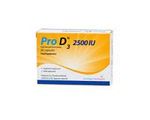Vitamin D is important. It helps our bodies to extract calcium from food and so keep our bones and teeth sturdy. It also plays a major role in the immune system and in maintaining good muscle and brain function. Some of our vitamin D intake comes from food, including fatty fish, margarine and eggs, and some is produced in the skin after exposure to sunlight. In our changeable climate, though, we may not always see enough of the sun. And if you do not go outside very often or do not eat enough of the right foods, you can develop a vitamin D deficiency.

Vitamin D deficiency
Treatments
- All treatments
- Prescription medicines
- Non-prescription medicines
- Relevance
- Name A-Z
- Name Z-A
- Price low-high
- Price high-low
How does Dokteronline work?
At Dokteronline, you can get expert advice from doctors quickly, without the hassle of visiting your GP’s surgery. Take care of your health with reliable treatments and information from the comfort of your home.
Select your preferred treatment
The doctor will review your medical request
The pharmacy will ensure your medication is delivered to your doorstep
Symptoms
A lack of vitamin D can cause a variety of symptoms, including:
- muscle pain, cramps or weakness;
- gloominess or depression;
- fatigue or listlessness.
In the long term, vitamin D deficiency can lead to osteoporosis (weakened bones) or, in children, abnormal bone development. It has also been linked to a higher risk of suffering from conditions like diabetes, cancer and heart disease.
Treatment and prevention
Complaints caused by vitamin D deficiency can be prevented or treated by using a suitable dietary supplement. Children, the elderly, people who spend a lot of time indoors and those with dark skins are particularly advised to take extra vitamin D.


